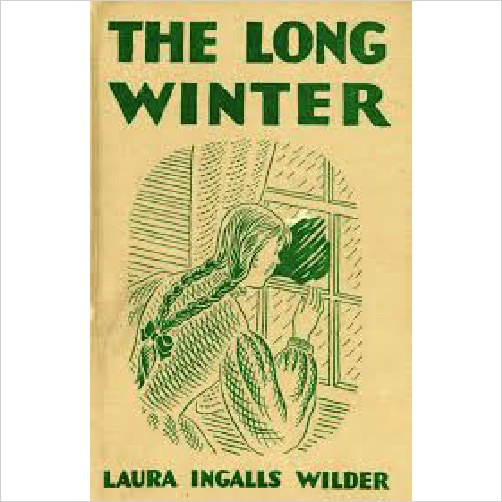Musings - The Long Winter
In March of 2019, pretty much everything was shut down. We were going to see what this new virus was. Was it going to be devastating like the Spanish Flu? How long should we wait and see?
What happened for sure was that many people found themselves at home and without any idea of how to be at home.
Many sought out advices in the pages of Laura Ingalls Wilder's book The Long Winter. People talked about fictionalized-Laura's days spent twisting hay for the wood stove with Pa and the seemingly endless barrage of blizzards and sound of wind that turned the brain to mush.
The real Laura's long winter of 1880-81 was worse than the fictional account according to her autobiography, Pioneer Girl, and mostly our lives were not nearly as bleak or fraught with threat of starvation or freezing to death. Yet we wondered all the same, because many of us were suddenly isolated from family and community and we really did not know how the future would be impacted.
Did The Long Winter teach us anything as we hoped it would? Were we as vulnerable as Laura and her family? Did the winds howl in our ears until we were numb enough to forget to stoke the fire and freeze to death as Laura felt she might?
I admit each person's "long winter" is his/her own. Most young people have never ever experienced a national trauma before. Many people live in cities and rely on readily available goods and services. But there were people who had life- and livelihood-threatening experiences and took to heart Laura's story and chose to prepare for the unexpected future, some as preppers, some as gardeners, some as full-fledged farmers.
So people baked bread. They ordered seeds and learned to garden in their front yards and on their balconies. Those who could got laying hens. Many people looked to history and victory gardens as inspiration, others looked to the internet and media for news. Society split firmly into two camps as they looked forward. Wait for and rely on corporations and government to sort this out or strike out on their own, modern pioneers, resolved to remain sovereign.
In the 1960s and 70s, the back-to-the-land movement was inspired mainly by a feeling of artificiality in the mainstream. Our grandparents had had chickens and gardens and taught us what they did during the Depression and the Wars and we loved that simple and joyous comfort in their homes. In 2019, those of the same age as the hippies were one to two generations removed from that knowledge. They had Amazon, sourdough starter, and the internet. They exercised online. They worked online. They spoke to friends online. And they watched You Tube.
In 2019, there were already established homesteader You Tube channels and blogs out there. But that year, their audiences grew by leaps and bounds. New channels and blogs popped up as gardens and "crazy chicken ladies" (men or women) became the gateway drugs to actual homesteading - producing one's own food, in many cases almost completely - and possibly expanding to become a small farm operation as an alternative to working outside the home.
In 1881, Pa, on sunny days, did everything he could to keep his family fed and help others. If his family or any other family starved, that was no good for the community. But he had little time before the next storm was to fall. If we learned anything from The Long Winter perhaps it is simply that. Perhaps we learned that the most vulnerable is not any specific type of person but the community, itself, and as long as we, on sunny days when the winds of trauma are not howling in our ears, prepare for the unexpected so we can strike vulnerability off the list.
2019-2021 reminded us that in the cycle of history our comfort and security are not guaranteed and can be decimated suddenly. From the book, we have learned to not rely on trains and ships and corporations while we sit at home. We can revive the home as a safe haven and not a prison. We simply must learn how to be at home and we must also learn how to connect that home with the community regardless of outer circumstances. The good news is more people are learning from history to be ready for the unexpected, because it is inevitable and always comes. Young and old are flocking to the knowledge using both high- and low-tech means and methods to live comfortably and safely during a crisis.
Next time, I think we'll be more prepared with a bright heart and kind words, a garden, and maybe a pantry full of soup so can weather another metaphoric long winter with more grace and less fear.
SOME FAVORITE YOU TUBE CHANNELS OF MINE:
RoseRed Homestead - https://www.youtube.com/c/RoseRedHomestead
Justin Rhodes - https://www.youtube.com/c/JustinRhodesVlog
Edible Acres (permaculture) - https://www.youtube.com/c/edibleacres
Homesteading Family - https://www.youtube.com/c/HomesteadingFamily
The Townsends (18th century) - https://www.youtube.com/user/jastownsendandson

Comments
Post a Comment